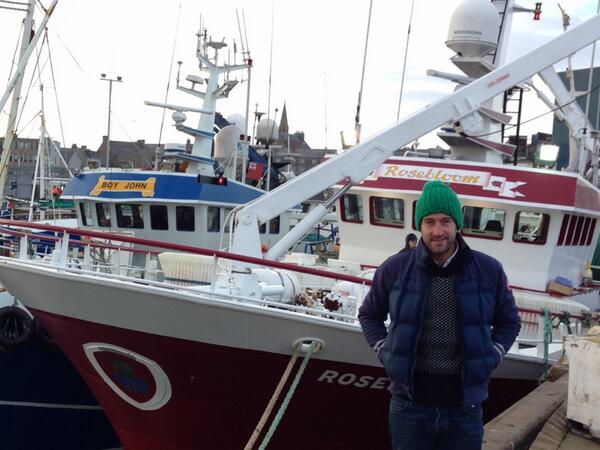Kathryn Stack, Senior Political Advisor to Struan Stevenson MEP, Senior Vice-President of the European Parliament Fisheries Committee, writes on the influence of the Green lobby/NGOs in EU fisheries policy decision making.
Somewhat surprisingly, dismay over the state of commercial fishing has been propelled to the forefront of middle class dinner party conversation across the country. Venting over the rapidly declining fish stocks seemingly on the brink of collapse has suddenly become “du jour”.
Have we suddenly become qualified experts in the intricacies and complexities of EU fisheries policy? Or have we unfairly become the victims of the exploitative nature of Green activists?
The present day environmental fisheries lobby, a once radical fringe movement, has suddenly sunk their claws firmly into mainstream European politics. They show no signs of moving. Once a well-intentioned operation, it has become a confused and misguided witch-hunt, condemning fishing industry leaders and politicians, armed only with ecopropaganda and anti-science policies. Only 58 of the 766 total MEPs are members of the Green grouping. So how and why, are we allowing the Green lobby to dictate our fisheries policy?
The Green lobby survive on employing apocalyptic, scare-mongering tactics. They disseminate hysterical slogans arguing that the world’s seabed will be ruined forever if we do not impose a blanket ban on all deep sea fishing. They panic politicians that overwhelming numbers of their constituents have signed a petition to ban discards. We are made to believe that there is no time for debate and we must act now. Such impassioned strategies mobilise naïve do-gooders and prompt decision-makers into knee-jerk reactions, without debating the potentially catastrophic consequences. These issues certainly do need our immediate attention but we must act sensibly and legislate appropriately.
Green must be goodWe are persuaded that if it’s green, it must be good. Whether well-intentioned or not, such initial passion for an environmental conscience is ultimately lost among fossil-fuelled convenience and only the fishermen are left to face the consequences.
Such tactics have led to unfair hate campaigns across the EU specifically targeting advocates of the fishing industry. The most recent, the Fish Fight campaign, led by TV chef Hugh Fearnley-Whittingstall, propped up by the Green lobby, brought to the masses the horrendous practice of discarding perfectly edible fish overboard. Those who rallied the UK general public against ‘useless politicians in Brussels’ failed to mention those who had campaigned relentlessly for years against this abhorrent practice. Eventually Hugh’s gung-ho blanket ban on discards was picked apart by the scientific community and he soon realised why a ban was not as easy as first thought. Thankfully, Brussels agreed that a blanket ban would not work and has now implemented a sound discard ban targeting specific areas with a phased-in timeframe. Yet, once Hugh’s own campaign had run out of steam, he decided to promote an unresearched yet spirited campaign for areas of sea to be closed from fishing arbitrarily. He was quietly given a dressing down by WWF and has seemingly given up. Whilst he must be applauded for his efforts, albeit media-fuelled, ignoring and even berating stakeholders and politicians will only alienate the very people who have the power to change things.
Similarly, the recent proposal for a ban on deep sea trawling was hijacked by the NGOs who launched a full blown campaign in widespread media outlets and publicly denounced politicians who disagreed. Newspaper adverts showing naked celebrities with dead fish draped over their bodies appeared in a ‘not in my name’ style attack, towering banners were hung from the rafters in Paris’s Gare du Nord and scathing slander of fishing industry leaders flooded online forums. The proposal, which was not supported by the international scientific community, was narrowly rejected yet would have brought catastrophic consequences to the sector with an immediate 10% of UK active vessels being wiped out instantly. Incessant and inaccurate condemnation of bottom trawls is unreasonable and goes beyond legislative proportionality. An easy digestible one-size-fits-all approach grabs the headlines but is certain annihilation of the sector. Instead, a rational approach incorporating the sector would bring fishermen on board to ensure the sustainability of the sea bed and the deep sea species.
Yet despite such expensive, impassioned lobbying, the misanthropic green movement is barnacled by hyperbole and misjudgement. Huge amounts of money are donated to these causes, ruling out any attempt at sensible compromise. Their objectives, coated in a green veneer, are always grand, heavily funded gestures of bans and restrictions; not the management projects which will actually help fishermen catch sustainably and their coastal communities to thrive. In fact, their disproportionate insistence for shark fin bans, deep sea bans and in fact discard bans could have ruined huge swathes of local fishing communities across Europe.
The Green lobby risks only being viewed as an industry that thrives on exploiting the innocent and well-intentioned. Advocating disproportionate legislation through scaremongering will not protect our oceans. This idealism is not real environmentalism. Real environmentalism should involve the only people who can protect fish stocks; fishermen themselves, who can implement real changes to promote sustainable fishing.





























